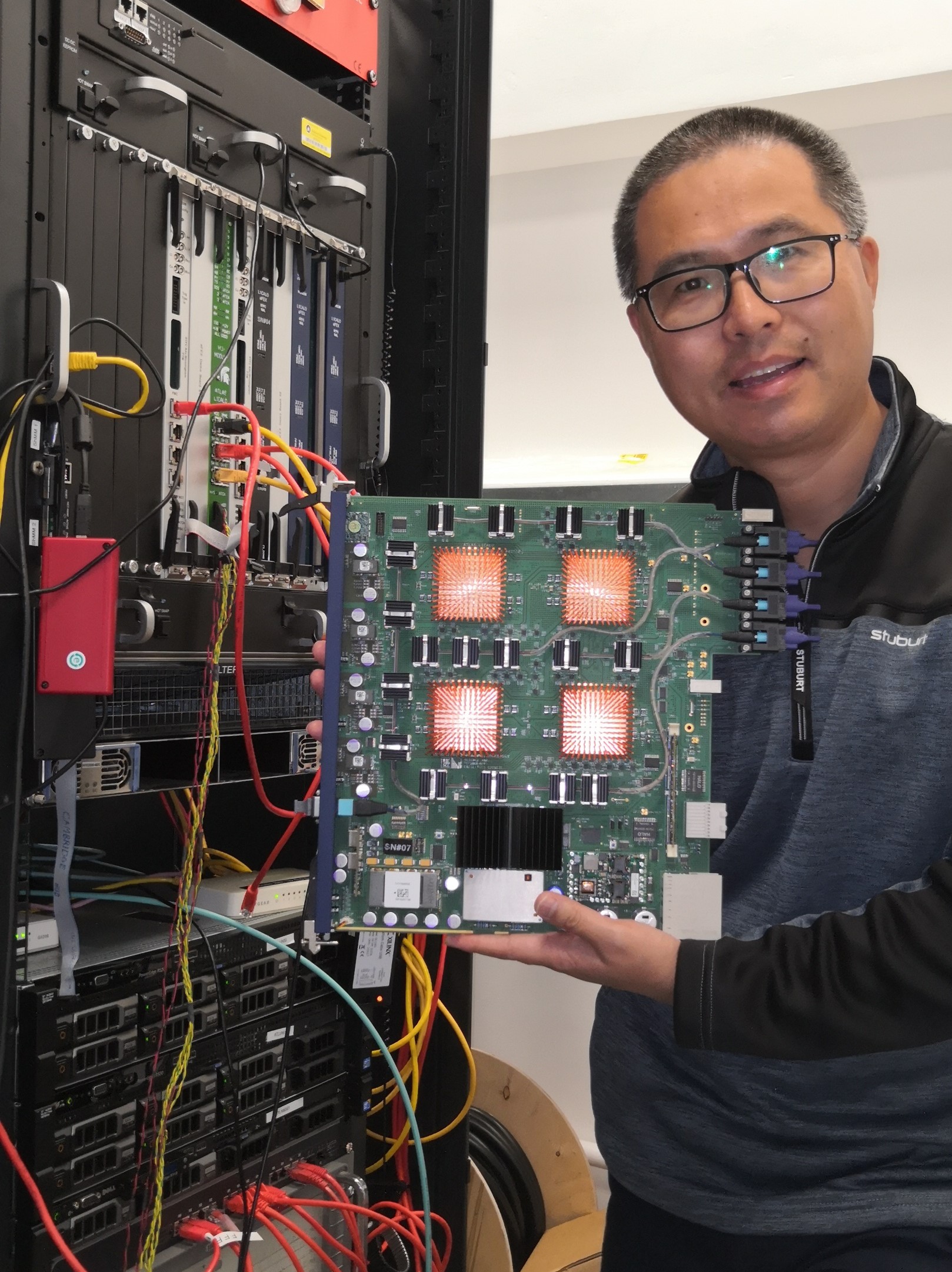STFC's Technology and Particle Physics Departments have been instrumental in developing the Electron Feature Extractor (eFEX) module, one of the essential upgrades to the ATLAS detector at CERN's Large Hadron Collider.
 A member of our Electronic System Design Group holding the eFEX module
A member of our Electronic System Design Group holding the eFEX module
The Large Hadron Collider (LHC) produces so much data that, if it was all recorded, ATLAS would fill up every hard drive in the world in a matter of months.
The Level-1 Calorimeter Trigger (L1Calo) is responsible for sifting through this data and identifying events worthy of further analysis – keeping only one in a billion collisions.
Physicists at the LHC are looking for rare and interesting physics processes, like the Higgs boson decaying into pairs of electrons, so separating events of interest from other particles and noise is an essential process.
Starting in December 2018, ATLAS would undergo many major upgrades as a part of 'Long Shutdown 2,' including to L1Calo.
The eFEX was developed during this three-year period to support the trigger chain to filter through the 40 million proton collisions that occur every second within the ATLAS detector.
Special eFEX
STFC's Technology and Particle Physics Departments played a pivotal role in the development of the eFEX, a new and fundamental element of the trigger chain.
The eFEX is responsible for detecting patterns of energy deposits in the calorimeter that are characteristic of isolated electron and tau particles.
Compared to previous trigger modules, the subsystem examines data of finer granularity and runs algorithms of greater complexity while maintaining low energy thresholds.
It increases the discriminatory power of the trigger, allowing the experiment to maintain good physics selectivity despite the increased collision rate that the LHC can now achieve.
The eFEX was installed in ATLAS in September 2022, running in parallel with the previous system- the Cluster Processor Module.
During this period the new system did not contribute to the ATLAS trigger decision, but its performance was evaluated, and its operating parameters optimised.
As of May 2023, the eFEX has taken over from the Cluster Processer Module as the primary electron trigger for ATLAS, able to differentiate between the signals coming from electrons and other sources 20% more efficiently than its predecessor.
International Collaboration
The Technology Department's Electronic System Design Group (ESDG) were involved in the development of the eFEX modules, designing the hardware and firmware, and leading project management.
The Particle Physics Department, along with the University of Birmingham's School of Physics and Astronomy, were contributors to the firmware design of the modules as well as being responsible for testing and controlling the software.
The University of Cambridge and the Queen Mary University of London also contributed to the larger L1Calo upgrade project.
The project's international collaborators include Heidelberg University, the University of Mainz, Stockholm University, the Universities of Chicago, Indiana, Michigan State, Oregon, and Pittsburgh, and the Brookhaven National Lab.
Ian Brawn, of STFC's Technology Department, said:
“As the collision rate of the LHC increases beyond that for which the ATLAS experiment was originally designed, the eFEX will play a vital role in helping ATLAS maintain its sensitivity to key physics processes.
While the eFEX hardware was designed by the RAL Technology Department, we have worked in close collaboration with our colleagues in PPD and the University of Birmingham, along with a number of international contributors.
We have also benefitted from a close working relationship with Incap Electronics UK, who showed perseverance and resilience in assembling the eFEX modules in unexpectedly challenging circumstances due to COVID-19 and supply problems.
I am very pleased that the eFEX is now fully installed and working in ATLAS."
Written by Catherine Lewin-Williams.
